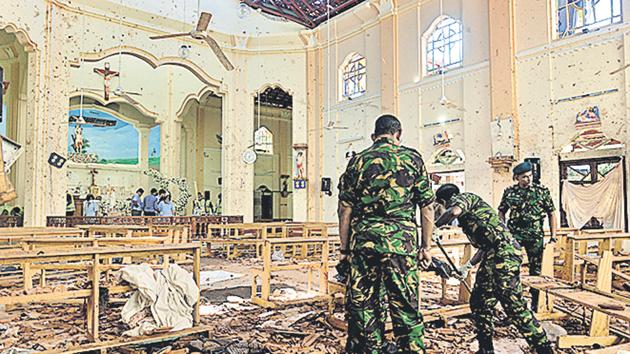New age terrorists are better educated and far more resourceful
To win against them requires a fundamental change in how we define, understand and respond to terrorism.
Of late, there appears to be a sense of bewilderment in the aftermath of terrorist attacks that the perpetrators were “rich and educated”. It appears incredulous that socially and economically emancipated individuals would wilfully embark on suicide missions. This astonishment stems from the myth that terrorism is the recourse of only the illiterate and poor. Which is because the phenomenon of terror is often misunderstood.

Terror is an instrument of war, period. Denunciations and condemnations do not change that fact. It is just as abominable as, say, a nuclear bomb, or napalm and yet, it is only a tool in the arsenal of a group, organisation or country seeking to dominate another group, organisation or country. This instrument has been used by most countries at some point either directly, or indirectly by supporting it, or to justify their own actions. The US and the erstwhile Soviet Union have slaughtered hundreds of thousands of individuals branding them as terrorists and enemies of the State. When the US napalmed the Viet Cong or Soviets gassed the Taliban, they legitimised it as the fight against terror, not against Vietnam, or Afghanistan!
Similarly, India had initially supported Tamil separatists in their struggle against the Sri Lankan government and then did a policy volte-face by fighting those very “terrorists”. China has supported separatist groups in India as indeed Pakistan continues to do till date. Despite pontifications to the contrary, terror has always been used as a tool of war by State and non-State actors.
At an individual level too, one man’s terrorist is another’s freedom fighter. Nobel Laureates have been branded as the enemies of the State. Nelson Mandela, Aung San Suu Kyi, and our own freedom fighters have been jailed and executed on charges of sedition and terrorism, at times using the very same penal codes applying which contemporary terrorists like Kasab have been hanged.
The point is, terrorism is best understood and therefore dealt with, by treating it as an objective instrument of war rather than some unspeakable abomination. And war needs soldiers.
Terrorists see themselves as soldiers to their cause. Starting from the first suicide bomber, Iranian Mohamed Hossain, who was just 13 when he flung himself and a satchel of explosives under a tank, blowing up both, to the Easter Bombers in Lanka, suicide squads believe they are fighting a just war. After all, they put their life where their mouth is. They are akin to elite troops in every army of the world. Hitler’s SS, Japan’s Kami Kaze pilots, our own Special Forces are all motivated and trained to expect more casualties and at times near certain annihilation during their missions. Many units proudly announce that fact on their uniforms.
Training soldiers or terrorists is a similar process. There is the element of motivation, which is the "why", and an element of combat prowess, which is the "how". Terrorism, especially suicide acts, are by definition based on volunteers, so susceptible age groups are targeted. There is a rallying call usually around persecution, which may or may not be true and forceful retaliation is offered as a just solution. The “brainwashing” taps into the primal level of laudatory validation among those who volunteer to be the chosen ones. Soldiers from armies across the world routinely volunteer for extremely hazardous missions for the honour, glory or sense of duty, all of which are euphemisms for social acknowledgement, the same emotions on which suicide bombers are acting. Morality aside, it needs an extraordinarily level of motivation to be calm enough to fly a plane in the knowledge that it would be exploding within minutes.
Motivation per se is not the prerogative of the illiterate or poor. On the contrary, the call to avenge unjust atrocities by inflicting merciless damage on the enemy, has always attracted intellectuals and the well off. Barring an odd exception, virtually every terror movement’s founders have been well educated and resourced and most have taken part in active combat, which is often an essential rites of passage for senior leadership positions and attracting personal loyalties. This sense of social value is more attractive to those who are not struggling with existential crises.
Yes, the poor and the persecuted will resort to terrorism if their existence or identity is threatened, but those will usually be movements like Liberation Tigers of Tamil Eelam (LTTE), Maoists or United Liberation Front of Assam (ULFA) with sectoral aspirations. But for groups with global ambitions, it is necessary to leverage ideological differences that have global appeal rather than "territorial" disputes. For instance, the LTTE or the ULFA would have been content with carving out a separately administered region, but an ISIS lays claim to all regions. In macabre but accurate terms, global terror groups need global leaders capable of independent operations.
International terrorism is modernising. The 26/11 Mumbai attacks followed a model of high calibre, resource-intensive planning at the top and were executed by well-trained but “dumb” troops at the frontlines. None of the 26/11 terrorists could have a shelf life beyond their shootout capabilities. They were meant to be dumb instruments who carried out orders. But the new crop of attackers has taken high intelligence quotient and resources to the frontline. Not only will they be better educated and resourced in their origins, but also be more sophisticated and resourceful in their lethality. Winning against them requires a fundamental change in how we define, understand and respond to terrorism.
Raghu Raman is former CEO of Natgrid
The views expressed are personal






